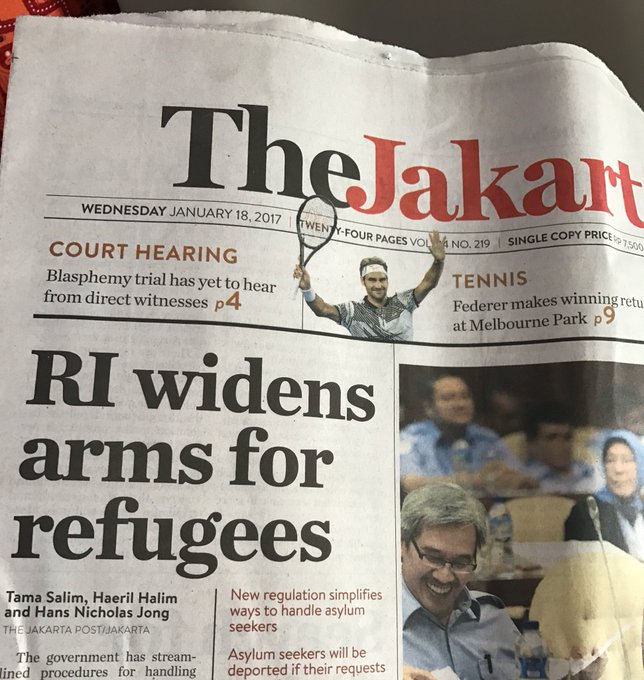A Brief Colonial History Of Ceylon(SriLanka)
Sri Lanka: One Island Two Nations
A Brief Colonial History Of Ceylon(SriLanka)
Sri Lanka: One Island Two Nations
(Full Story)
Search This Blog
Back to 500BC.
==========================
Thiranjala Weerasinghe sj.- One Island Two Nations
?????????????????????????????????????????????????Friday, February 3, 2017
Indonesian presidential decree provides hope for refugees
 (File)
Migrants during Friday prayers at a temporary shelter in Langsa, Aceh
province, Indonesia, Friday, May 22, 2015. Source: AP Photo/Binsar
Bakkara
(File)
Migrants during Friday prayers at a temporary shelter in Langsa, Aceh
province, Indonesia, Friday, May 22, 2015. Source: AP Photo/Binsar
Bakkara
IN one of his first acts as president, the United States’ Donald Trump
issued a four-month moratorium on refugee resettlement in his country.
The executive order signed last Friday also banned travel from citizens of seven Muslim-majority nations.
This announcement caused worldwide panic, including leaving hundreds of
Rohingya refugees residing in Indonesia’s North Sumatra already slated
for resettlement in the U.S. anxious and confused. The Indonesian
government openly expressed its “deep regrets about the policy.”
In oddly fortuitous timing, however, Indonesia earlier this month
introduced provisions for asylum seekers and refugees into its own
migration laws for the first time in history. A presidential decree
released by Joko “Jokowi” Widodo provides greater clarity regarding the
status of an estimated 14,000 asylum seekers and refugees currently
residing in Indonesia as they hope to be resettled elsewhere.
Until now, Indonesia’s legal system did not differentiate between
‘illegal aliens’ and asylum seekers, nor did it formally recognise
refugees already processed by the United Nations High Commissioner for
Refugees (UNHCR).
“We appreciate that this new Perpres (presidential decree) confirms the
definition of refugees contained in the 1951 Refugee Convention, and
does not continue to label asylum seekers as illegal immigrants,” said
Muhammad Hafiz, Executive Director Human Rights Working Group Indonesia
(HRWG).
The new legislation also provides clarity on the respective
responsibilities of governmental and non-governmental bodies in regards
to refugee asylum seekers. According to Febi Yonesta,
chair of the Indonesian Civil Society Network for Refugee Rights
Protection – SUAKA, “there is now an established coordination and a
clear function by Government in relation to the treatment of asylum
seekers, no matter the mode of their arrival.”
Amnesty International’s Deputy Director for Campaigns, Josef Benedict, responded to the
announcement by saying the “presidential regulation on refugees [is] a
positive step forward,” but that Indonesia “should ratify [the] refugee
convention next.”
Yet the UNHCR and refugee advocates in Indonesia – as elsewhere in
Southeast Asian countries that have not signed the convention, like
Malaysia – have continually emphasised the need for work and education rights as the most pressing priority for thousands languishing in limbo. As UK lawmaker Alison Thewliss argued this
month, “restricting the rights of asylum seekers to work is not only
morally questionable, but doesn’t make economic sense.” In ASEAN, only
the Philippines and Cambodia have ratified the Refugee Convention, yet
neither have ever resettled refugees in significant numbers.
The Rohingya issue may well change the tide in favour of refugees in the region, however.
The release of Indonesia’s refugee legislation was partly stalled due
to the number of Indonesian ministries involved in its implementation –
foreign, health, security, law, police and immigration. Some advocates
argue that the release of the presidential decree now – after being
drafted back in 2010 – reflects that the situation of the Rohingya
Muslim minority in Burma has rallied Indonesians and their government in
support of refugees.
Thousands of asylum seekers remain detained in one of 13 rudenim or ‘detention houses’ across Indonesia. A report entitled Barely Living was released in
late 2016 documenting the highly vulnerable situation of Rohingya
refugees in Indonesia. Nevertheless, the Rohingya issue has galvanised
Indonesian government and civil society in a way unlike other groups of
people seeking asylum before them. Reports of abuse by the Burmese
military provoked protests outside
Myanmar’s embassy in Jakarta last November. Indonesia’s foreign
ministry recently offered formal guidance to Aung San Suu Kyi’s
government on how to foster a peaceful, pluralistic democracy.
Elsewhere in ASEAN, Malaysia recently committed US$2.2
million to aid the Rohingya community in northern Burma, whilst
announcing the forthcoming trial of work rights for refugees within its
own borders. Even controversial Philippine President Rodrigo Duterte declared last November that he would provide asylum to refugees until his country is “filled to the brim.”
2016 was the deadliest year yet for refugees, as Europe closed its borders to those fleeing conflict in Syria and across the Mediterranean.
Australia continues to pursue harsh border policies while the U.S. under
Trump looks to resettle far fewer, if any, refugees. Even those to be
resettled from Australia’s immigration detention centre on Nauru will be subject to Trump administration’s “extreme vetting.”
Asian nations may yet step up and play their part in providing asylum to some of the world’s most desperate people.



